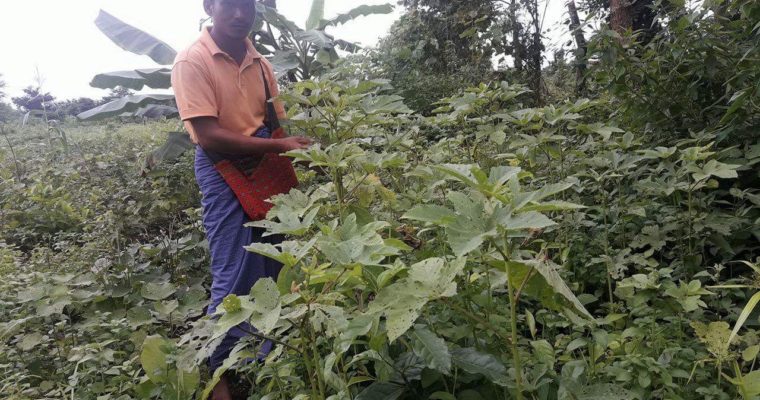Sagain, Myanmar – Chan Law is a Naga ethnic form Sagain Division, Lay Shi Township, Panset Village, Myanmar. Currently, he lives in Naw Phu village. Law comes from a family of farmers. Since he was a child, he had been helping farm his parents’ land. In 2010, He graduated with a degree in Geography at Magway University. He taught at a government school in Panset village for two years. However, he stopped teaching and wanted to do farming instead. Just as he was yearning and looking for an opportunity to learn about sustainable agriculture, he met a member of AFFM (Agriculture and Farmer Federation of Myanmar) who told him to apply at Network for Environment and Economic Development (NEED)-Myanmar Eco Village farm for an opportunity to learn about sustainable agriculture.
Law wanted to put an end to the use of chemical fertilizer and bring an alternative solution by using an organic one. He also worked on the idea of changing mono-culture to multi-culture farming to produce more varied crops. While at the NEED, Law’s hard work, enthusiasm and sincerity were noticed by his colleagues and classmates and he became an inspiration to them.
After 10 months of intensive course at NEED, he graduated and went back home. He started applying what he learned by creating a model farm using one acre of his family’s land where he grew seasonal crops using organic methods. He wants to raise awareness in his community about the use of organic methods such as using farm wastes as fertilizer. His goal is for his community to eventually stop using chemicals and return to the practice of organic farming.
Another thing he learned at NEED is the cultivation of straw mushrooms in sawdust. Growing this kind of mushroom only requires three days of work, and after at least one month, the mushroom can be harvested. He planned to create a mushroom farm on his land so he can earn a small amount for his family.
In 2017, Law, together with his brother, established one acre of land for tissue sawdust mushroom growing. The mushroom tissue was ordered from Yangon for 120,000 Myanmar kyats (USD 83). It took two months before he started harvesting his mushrooms, and from this, he earned an additional income of MMK 300,000 (USD 207) for a period of two months. Moreover, he was able to manage local resources to have zero farming waste by using the residue from mushroom growing as fertilizer for his vegetables on the farm.
Law has increased his farm to three acres, growing mushroom, vegetables, and breeding animals including ducks, chickens, and cows. He also earns a modest amount from selling chicken and duck eggs.
Law wants to share his skills with his community to help the unemployed people in their village to earn income. He urged his neighbors to do mushroom cultivation because this can be a quick way to earn money as straw mushroom only takes a few weeks to grow and can be harvested for a long time. In his village, many people do not have enough land to grow seasonal crops and earn enough money, thus he sees mushroom plantations as a solution to this problem as it does not require a spacious area.
Law believes that by using his experience from NEED-Myanmar, he can encourage and inspire other people in his community to do organic, natural, and traditional ways of farming. “My goal is to protect my community from the use of chemicals in our farms and to earn enough income. I know I will face many challenges, but I’m happy to share that I have done some activities that could be useful to my community,” he says.
Now, more than 30 households in the community became aware of organic farming. Out of these, five households started growing vegetables using organic methods to earn income for the daily expenses of their families. By doing this, they save money because they no longer buy vegetables from the market and they are even able to sell the surplus vegetables to the other people in their community. #




Comments are closed